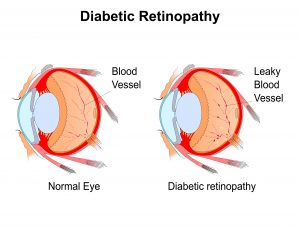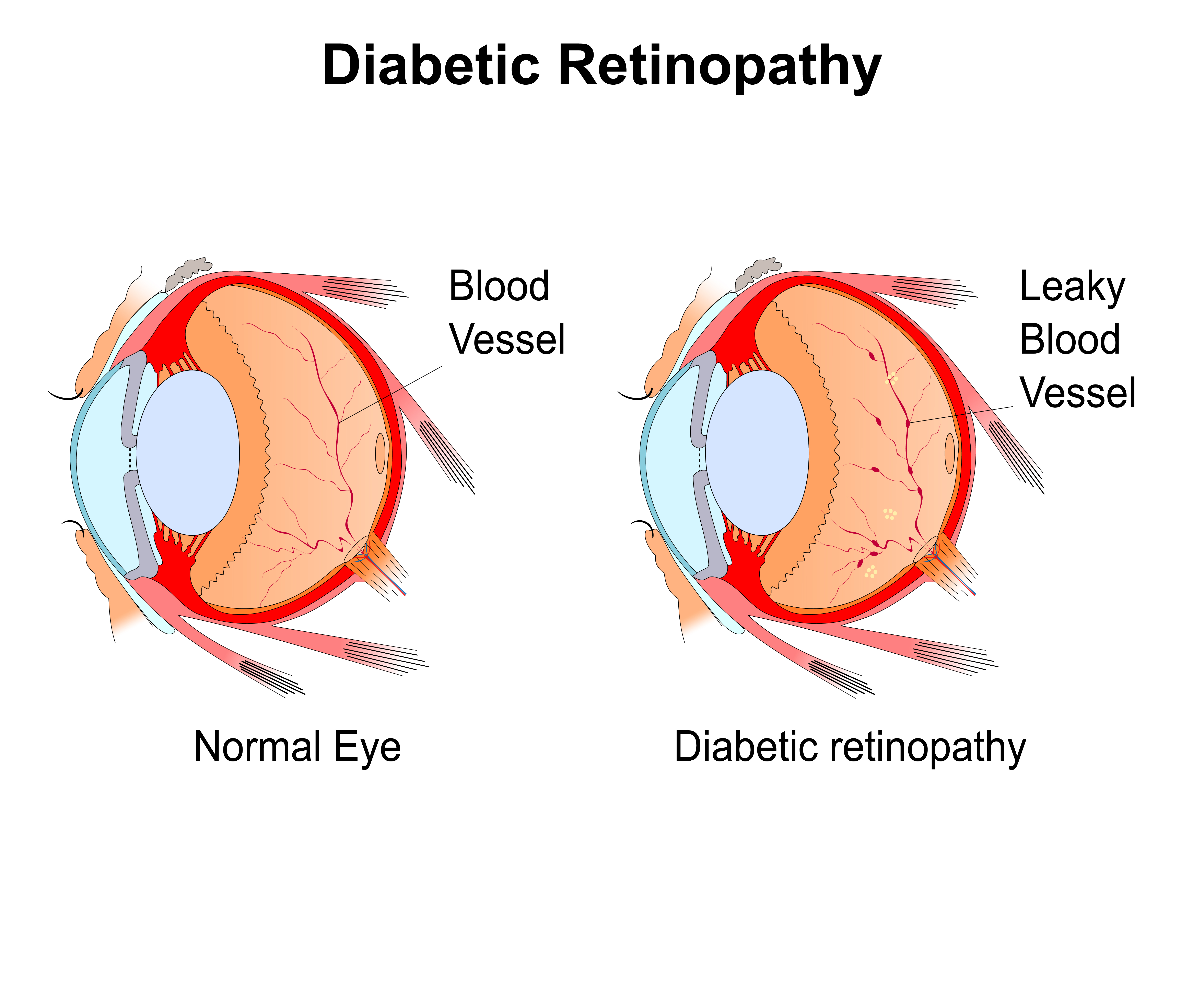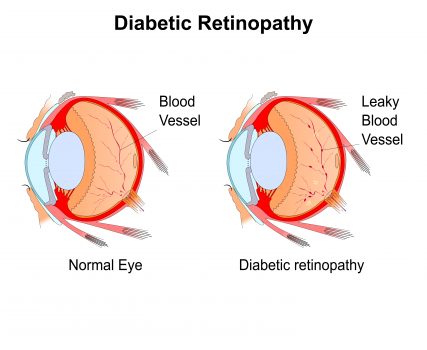What Is Diabetic Retinopathy?
Diabetic retinopathy is a disease in which Diabetes mellitus damages the retina. Diabetes mellitus that is high blood sugar levels, leading to cause vision disturbances and in some cases blindness, partial or total vision loss. It is also identified as diabetic eye disease.
It leads to causing damage to blood vessels in the retina. It affects the blood vessels as they can swell and leak. Or in some cases they can close, they can even stop blood from passing through the retina. Sometimes abnormal new blood vessels can also grow on the retina. All of these changes can lead to stealing of your vision.
It affects people mostly who are suffering from diabetes for 20 years or more. If someone has had diabetes for a prolonged duration, his or her chances of developing diabetic eye disease are high.

Causes
Over time, increase in high blood sugar levels affects blood vessels in the light-sensitive tissue called the retina. A tissue lines the back of the eye. It is the most common cause of vision loss among people suffering diabetes, and one of the leading causes of blindness. It is mostly seen among working-age adults. Diabetes is the main cause of this disease.
All forms of diabetic eye disease lead to causing severe vision loss and blindness.
Symptoms
There are two principal stages of diabetic retinopathy:
1. Non-Proliferative Diabetic Retinopathy:
It is an early stage of diabetic eye disease in which the walls of the blood vessels in your retina weaken, and tiny bulges (microaneurysms) start protruding from the vessel walls of the smaller vessels (in some cases) leading to the leakage of fluid and blood into the retina.
Larger retinal vessels also begin to dilate, and the vessels become irregular in diameter. It can progress from mild to severe as more blood vessel gets blocked. Nerve fibers in the retina are also affected as they may begin to swell. In some severe cases, the central part of the retina (macula) begins to swell (macular edema), a condition that requires immediate treatment from professionals.
2. Proliferative Diabetic Retinopathy:
It is an advanced stage. The growth factors secreted by the retina are triggered, and the proliferation of new blood vessels begins, which grow along the inside surface of the retina and turn into the vitreous gel, the fluid that fills the eye. These new blood vessels are fragile. It makes them prone to leakage and bleeding. Sometimes scar tissue can contract and cause retinal detachment that is the pulling away of the retina from the underlying tissue. Retinal detachment leads to permanent vision loss.
Prevention
You cannot always control or prevent this disease. But you reduce your risk of getting diabetic retinopathy or at least help it from getting worse. Starting from adopting a few lifestyle changes, which can also help, improve your general health and can reduce your risk of developing retinopathy, can make a huge difference.
According to Dr. Durocher, a Lafayette Optometrist, these small changes in your lifestyle can create a huge difference and can improve your health drastically.
Some prevention steps you can take are:
1. Manage Your Diabetes
By eating and choosing a healthy and a healthy diet – mainly reduce fat, salt, and sugar from your diet. Monitor your blood sugar level regularly.
2. Keep Your Cholesterol And Blood Pressure In Check
Daily physical activity is necessary. Losing those entire extra pounds if you are overweight – you should aim for a BMI of; you can use the BMI calculator to work out on your BMI and maintain it. Regular exercising can help you achieve the target BMI. Aim to do a minimum of one-fifty-minutes of light-heavy activity like cycling or walking, doing 10,000 steps a day can also be an excellent way to reach this target.
3. Reduce Or Stop The Use Of Tobacco Products
Discontinuing smoking, it increases many complications and increases your risk of getting diabetic eye disease.
3. Pay Attention To Your Vision Changes
If you observe any changes in your eyesight Contact your eye doctor immediately. If you experience sudden vision discomfort or your vision becomes spotty, blurry, or hazy, then do not ignore it these can lead to complications in future. Diabetes does not always lead to vision loss. So taking an active role in diabetes management and making some changes can lead a long way towards preventing complications for you.
Treatment
Diabetic Retinopathy may be treated with therapies that may be used alone or in combination. Several treatment centers and professional doctors available provide you with the best and affordable treatment you can have.
Remember, never ignore the symptoms and always have your regular eye checkups in many cases even in the diseases is identified long before it causes symptoms. As they say, that prevention is eternally better than cure.

